12th-Austrian born Polish ice hockey player Alfred Mauer was born in Peuerbach on this day in 1907. His club team was Pogoń Lwów and he played at the 1932 Winter Olympics. Only four teams took part in these Games – Canada, USA, Germany and Poland. Mauer’s Polish team were defeated in all 6 games, scoring only 3 goals, Mauer only played against the US team, which they lost 4-1 lost match. He died at the age of 92 on 10th May 1999 in Bytom, Poland.
Igor Anatolyevich Stelnov, born in 1963 in Moscow and died on 24th March 2009 aged 46. He started his hockey career with the CSKA Moskva junior team. In 1981 he was promoted to the seniors and he played with CSKA Moskva until 1991. He then played one season in Khimik Voskresensk, then spent a few years in various European clubs without much success and ended his career again with CSKA Moskva in 1996-1998. Stelnov was first selected for the Soviet Union national team to play at the 1984 Olympics. The selection of a young defender surprised many Soviet hockey experts as Soviet Union had many excellent and very experienced defenders at that time, like Slava Fetisov, Aleksey Kasatonov, Vasily Pervukhin, Zinetula Bilyaletdinov and Sergey Starikov. In addition to his two Olympic gold medals, Stelnov also won World Championships gold in 1986 and silver in 1987 and European Championships gold in 1986 and 1987. He also won the Canada Cup (precursor of the World Cup) in 1987 and was Soviet Champion from 1982-1989. After his playing career Stelnov worked as a coach with Hockey Club MVD. Igor Stelnov died of a heart attack after a long illness.
Canadian international Owen Liam Nolan, nicknamed Buster was born in 1972 in Belfast. Originally a baseball and soccer player Nolan began playing ice hockey at the age of nine. He moved to Ontario with his family at the age of seven months and spent 1988-1990 as a member of the Cornwall Royals of the Ontario Hockey League (OHL) prior to being drafted by the Quebec Nordiques of the National Hockey League in 1990. In the OHL he won the Emms Family Award as league Rookie of The Year in 1989 and the Jim Mahon Memorial Trophy as the top scoring right winger in 1990. Aside from six games with the Halifax Citadels of the American Hockey League during his first season, he stayed with the Nordiques until the 1995-1996 season (when they became the Colorado Avalanche), at which point he was traded to the league’s San Jose Sharks. His long tenure with the team lasted until 2003 (captaining the squad from 1998 until his departure) and along the way he made an appearance for Canada at the 2002 Winter Olympics, suiting up for six matches and taking home one of Canada’s first Olympic ice hockey gold medals in half a century. He also appeared on the front cover of Electronic Arts NHL 2001 video game for the PlayStation. He was traded to the Toronto Maple Leafs for the final half of the 2002-2003 season, but emerged after the 2004-2005 NHL Lockout and a year off to nurse a knee injury as a member of the Phoenix Coyotes. He spent the following two seasons with the Calgary Flames (2007-2008) and the Minnesota Wild (2008-2009)
Switzerland’s Jonas Hiller was born today in 1982. As a goaltender has played for EHC Biel of the National League (NL) as well as the Calgary Flames and the Anaheim Ducks, the team he began his NHL career with in 2007 after going undrafted in any NHL Entry Draft. Hiller played in goal for Switzerland at the 2010 Winter Olympics in Vancouver, British Columbia. Switzerland finished in eighth place, losing to the United States in the Quarter-finals. He also played goalie for Switzerland in the 2014 Winter Olympics in Sochi, where Switzerland finished in ninth place, losing to Latvia in the Qualification playoffs.
Andrey Karev born in 1985 in Elekrostal, Russia and was affiliated to Dynamo Minsk. He was selected for the Belarus men’s ice hockey team in the 2010 Winter Olympics, playing in four games. He had previously played for the Belarus U-20 national team, competing in the 2005 World Junior Ice Hockey Championships.
Meghan Christina Agosta, born on this day in 1987 in Windsor, Ontario. Her career on the ice began with figure skating at the age of four, but she added hockey to her sporting life a mere two years later, aspiring to be more like her older brother. She quickly honed her skill as a forward, playing with the Chatam Cyclones in the AAA division and the Windsor Wildcats of the Ontario Provincial Women’s Hockey League. As a member of Team Ontario she scored the goal that secured her team’s victory at the 2003 Canada Games. She then joined Team Canada and, in 2006, participated with the womens team in their gold medal victory at that year’s Olympic Games. At the tournament she played in five games and scored a hat trick in the match against Russia on her 19th birthday. Four years later she was again on Canada’s gold medal-winning Olympic squad and was named tournament MVP after scoring a record nine goals. In 2014 at the Sochi Games she won gold again with Team Canada, thus attaining her hat-trick of Golds. She attended Mercyhurst College in Pennsylvania and studied for a degree in criminal law and played on the college ice hockey team. Her success in NCAA Division I hockey was noticeable, earning numerous rookie awards, tournament MVP three times, College Hockey America’s Player of the Year award twice, their Three-Star Player of the Year Award once and captained the team, along with breaking many records. She has also sponsored a player in the Kingsville, Ontario Minor Hockey Association in hopes of building a foundation for future philanthropic efforts. In 2014, Agosta took a break from hockey and joined the Vancouver Police Department as a probationary constable, she graduated from the Vancouver Police Department Police Academy in May 2015.
- Albert Mauer
- Meghan Christina Agosta
13th – Born on this day in 1909 in Massachusetts, John Bright “Jack” Garrison, nicknamed The Cat, he passed away aged 79 on 13th May 1988. He was one of the finest amateur hockey players of the 1930s. In addition to his two Olympic successes, Silver in 1932 and bronze in 1936, he played on the 1933 US National team which won the World Championships in Prague, Czechoslovakia. It was his unassisted overtime goal which brought the US a victory over Canada in the final game. Garrison had prepared for international play at Harvard where he played from 1928 to 1932, both as a forward and a defence-man. After his playing days, he continued in business but found time to coach the 1948 US Olympic hockey team.
Austrian Lambert Neumaier was born in 1910 in Vienna. He made two appearances for the Austrian national team at the 1933 World Ice Hockey Championships. He also played two games for his country at the 1936 Winter Olympics. He played club hockey for Wiener EV in the Austrian Hockey Championship and died in July 1986
René Berra was born today in 1942 in Switzerland where he played for HC La Chaux-de-Fonds in the National League A. He also represented the Swiss national team at the 1972 Winter Olympics.
Sergey Kapustin, born in Ukhta, Russia on this day in 1953 began his hockey career with Neftyanika Ukhta in 1970, but in 1971 joined Krylya Sovetov Moskva, playing there until 1977. With Krylya Sovetov he won the Soviet title in 1974 and the European Champions Cup title in 1975. In 1977 Kapustin joined CSKA Moskva and played with them until 1980, winning three Soviet and European Champions Cup titles (1978-80). In 1980 he joined Spartak Moskva, where he stayed until 1986 and then played two seasons in Austria, the first season with Innsbrucker EV and the second season with EC Salzburg, before retiring in 1988. Internationally Kapustin won Olympic gold in 1976, was a World Champion seven times (1974-75, 1978-79, 1981-83), and European champion six times (1974-75, 1979, 1981-83). He also won silver at the 1976 World and European Championships, bronze at the 1977 World and European Championships, and another silver at the 1978 European Championships. Kapustin was the top goal scorer at the 1974 World Championships with 10 goals. In 1979 he helped to win the Challenge Cup between the Soviet Union and the NHL All-Stars and in 1981 won the Canada Cup, also winning a bronze at the 1976 Canada Cup
Sweden’s Mats Johan Sundin was born today in 1971 in Stockholm, and was affiliated to the Toronto Maple Leafs, Toronto, Canada. Internationally, Sundin won three gold medals with Swedenm at the World Championships and a gold medal at the 2006 Winter Olympics in Turin. He was elected to the Hockey Hall of Fame on 26th June 2012, in his first year of eligibility. He became the second Swede, following Börje Salming (another long-time Maple Leafs player), to be chosen to the Hall of Fame. Sundin was also inducted into the IIHF Hall of Fame in 2013. In 2017 Sundin was named one of the ‘100 Greatest NHL Players’ in history. I
Juha Petteri Ylönen, born today in Helsinki in 1972, was nicknamed Jussi. He played five seasons in Finland’s SM-liiga before moving to North America to play. He joined the Phoenix Coyotes (which Winnipeg had become after relocation) for the 1996–97 season, appearing in two NHL games. He then played four full seasons with the Coyotes until he was traded prior to the 2001–02 season to the Tampa Bay Lightning in exchange for Todd Warriner. Ylönen played 65 games for the Lightning that season, but was dealt to the Ottawa Senators at the trade deadline in exchange for Andre Roy and a pick in the 2002 NHL Entry Draft. After the 2001–02 season, Ylönen left the NHL and returned to Finland to play. He played two seasons for the Espoo Blues, with the last being the 2003–04 season. In his NHL career, Ylönen appeared in 341 games. He scored 26 goals and added 76 assists. He also appeared in 15 Stanley Cup play-off games, recording seven assists. In addition, he won a bronze medal as a member of the Finnish team at the 1998 Winter Olympics.
Japan’s Yoko Kondo was born in Hachinohe today in 1979 and began playing ice hockey at age six in Aomori, largely because her older brother played the game and she wanted to follow him. She began playing professionally in 1995, and qualified for Japan’s first Olympic women’s ice hockey team during the 1998 Winter Olympics, where the team where 6th. Kondo felt she personally lacked physical strength to compete with foreign players, and that the team was not playing at a level capable of winning due to the lack of clear aims and a consistent training programme. She believed if the team continued to improve, they could eventually qualify for the 2014 Winter Olympics. Kondo participated in four Division I International Ice Hockey Federation world championship tournaments between 2001 and 2013, with Japan placing second in 2001 and 2005, first in 2007, and fourth in 2013. She plays as a defenc-man with the Seibu Princess Rabbits in the Japan Women’s Ice Hockey League, while also employed professionally as an office worker. In January 2014, Ilzuka Yuji, head coach of the Japan women’s national ice hockey team, played Kondo as a forward in a friendly match and found her speed, body size and powerful shots suited her for the role. Yuji decided to play Kondo as forward in the 2014 Winter Olympics, although she only started seriously training in the position in December 2013. At 35, Kondo was the oldest player on the Japan’s 2014 Olympic team, and the only one with past Olympic experience. In contrast to 1998, Kondo felt the team s better prepared to compete. The Japanese team finished in 8th place at those Games.
- Lambert Neumaier
- Yoko Kondo
14th–Charles Lavaivre, French ice hockey player, who was born in Chamonix on this day in 1905, competed at the 1924 Winter Games He died on 20th March 1967 aged 62. Affiliated to Chamonix HC, he and the French team tied for 5th place in the 1924 Olympic tournament with Czechoslovakia.
Born in Waterloo, Ontario today in 1906 – Norbert Edward “Stuffy” Mueller. A goaltender, Mueller graduated from St. Andrews College, an all-boys college in Ontario, before attending the University of Toronto and joining their ice hockey team as a member of several intercollegiate championship-winning teams. During the 1926-1927 season he was a member of the Toronto Graduates, the amateur senior mens hockey team that took the Allan Cup that year and was given the chance to represent Canada at the 1928 Winter Olympics. In his sole appearance, in the match against Great Britain, the team managed a score of 14-0, with Mueller blocking every single shot and helping his team win a gold medal in the tournament that year. After the Olympics, he played for several seasons with the amateur Toronto National Sea Fleas of the Ontario Hockey Association, including an Allan Cup victory in 1932. After retiring from hockey, he had a career as an insurance writer and remained athletically active in golf and curling until his death, at the relative young age of 50, from a heart attack in 1956. Ged 50
Vincent Lukáč, born in 1954 in Košice, Czechoslovakia was a Slovakian right winger who had a career that lasted from 1971 to 1990. Club-side he played for HC Košice (the most successful player in history of the team – 14 seasons, 518 games, 393 goals), as well as that he played for HC Dukla Jihlava, SC Rosenheim, WEV Wien, Kirkcaldy, HC Streatham Redskin in London and Fife Flyers of Scotland. He was drafted by the Quebec Nordiques in 1985 (at the age of 31), but he never played the NHL. He was a coach of HC Košice, the Slovak national ice hockey team and MsHK Žilina, Slovakia. He played 146 times for Czechoslovakia, scoring 70 international goals. This included appearances at the 1980 and 1984 Winter Olympics, winning silver in 1984, and the 1984 Canada Cup. He competed four times at the World Championships (1977, 1982-83, 1985), winning gold medals in 1977 and 1985, and silver medals in 1982-83.
Born on this day in Bergen , Norway in 1965 – Geir Hoff. He began his career in Sweden for Västra Frölunda before spending two seasons in Michigan State University. Hoff then played in the Norwegian Elitserien for Vålerenga Ishockey, Furuset Ishockey, Lillehammer IK and the Spektrum Flyers between 1987 and 1995 before returning to Vålerenga for a second spell, eventually retiring in 1999. He was also a member of the Norwegian national ice hockey team, and participated at the Winter Olympics in 1988, 1992, and 1994. He was Norwegian champion in 1988, 1990, 1994, 1998, and 1999. He was awarded Gullpucken as best Norwegian ice hockey player in 1991.
Carl Christian “Calle” Johansson, born in 1967, is a former assistant coach with the Washington Capitals and retired professional ice hockey defenceman who played 17 seasons in the NHL between 1987 and 2004, most of it with the Capitals. He has worked as hockey colour commentator for Swedish Canal+ and worked as an assistant for six seasons for Frölunda HC in the Swedish Elitserien before returning to the Capitals organization. In July 2014 he returned to Sweden to be with his family.
American Sean Ronald Hill, born on this day in 1970 in Duluth, Minnesota, skated defence for the University of Wisconsin, helping them win the 1990 NCAA Championships. He had a long NHL career that began with one game in the 1991 season with the Montreal Canadiens, and lasted through the 2008 season. He later skated for the Mighty Ducks of Anaheim, four seasons with the Ottawa Senators, six seasons with the Carolina Hurricanes, and brief stops with the St. Louis Blues, Florida Panthers, New York Islanders, and the Minnesota Wild. His NHL career consisted of 876 games, in which he scored 62 goals and had 236 points. Hill played for the US at the 1990 World Junior Championships, the 1992 Winter Olympics, and the 1994 World Championships. He finished his hockey career with EHC Biel-Bienne in the Swiss hockey league. Hill is known as being the first NHL player suspended for using performance enhancing drugs (PEDs), which caused him to serve a 20-game suspension in the 2007-00 season.
Viktor Nikolayevich Kozlov, born in Russia in 1975 was drafted by the San Jose Sharks in the first round as the sixth overall selection in the 1993 NHL Entry Draft. He scored his first career goal for the Sharks against Ed Belfour and the Chicago Blackhawks on 21st March 1995 in a 7–3 Sharks loss. He played a few seasons in San Jose before being traded to the Florida Panthers in 1997. During the NHL lockout that wiped out the 2004–05 NHL season, Kozlov played for Lada Togliatti in the Russian Superleague(RSL). However, he returned to the Devils when the NHL restarted. After playing for various NHL and RSL, injury forced him to miss the whole of the 2013-14 season with CSKA Koslov. After returning to good health he signed a one-year contract to provide a veteran presence with Avtomobilist Yekaterinburg. In September 2015, Kozlov retired from playing hockey, joining Metallurg Magnitogorsk as their assistant coach in 2015. At international level he represented Russia between 1992-2010, winning World Championship silver in 2010 and bronze in 2005.
Milan Hejduk, Czech born American forward was born in 1976. He spent all 14 years of his NHL career with the Colorado Avalanche, and retired holding the record for most career games as an Avalanche player (1020). On 13th September 2017, it was announced that the Avalanche would be retiring Hejduk’s number 23 during the 2017–18 season, and it was officially retired by Colorado on 6th January 2018. He represented his country at both junior and senior level, playing in three Winter Olympics, winning Gold in 1998 and bronze in 2006 as well as a World Championship bronze in 1998.
- Charles Lavaivre
- Milan Hejduk
15th–Walter Sachs born in Berlin in 1891 earned nine international ice hockey caps and was a German Champion in 1914, 1920-21, 1923-26, and 1928-30 with Berliner SC. He played at the 1928 St. Moritz Winter Olympics with Germany, where the team were eliminated in the first round. Before World War I Sachs was part of the German team at the 1912 and 1913 LIHG Championships. In 1927 he took part at the European Championships winning a bronze medal with the German team. He was later inducted into the German Hall of Fame for Ice Hockey.
British ice hockey player Carl Alfred Erhardt was born today in 1897 in Beckenham, London and died aged 91 on 3rd May 1988. Great Britain won the 1936 Olympic ice hockey tournament on the day after Carl Erhardt’s 39th birthday and he is the oldest player in Olympic history to have won a gold medal for ice hockey. He learned the game at school in Switzerland, Austria and Germany, and on his return to England he joined the Princes Club when it was revived in 1926. He later played for Streatham and captained the British team that finished third at the 1935 World Championships. He was also captain of the 1936 Olympic team, playing in six of the seven matches. After his retirement, Erhardt wrote a book on the sport and coached the 1948 Olympic team. He was a referee at the 1950 World Championships in London and served as a committee member of the governing body for many years, before being elected a life vice-president of the British Ice Hockey Association. As well as being a director of an engineering company, Erhardt was also a founder and the first president of the British Water Ski Federation. He was posthumously elected to the IIHF Hall of Fame in 1998 and in 2012 the Elite Ice Hockey League named one of its two newly introduced conferences after him.
Ferenc Szamosi, also known as Sztoics,was born in 1915 in Budapest and died on 14th july 1968 aged 53. He played both ice and field hockey and competed in the 1936 Summer and Winter Olympics. In the Winter Games he was part of the Hungarian ice hockey team which was eliminated in the second round of the tournament, he played all six matches. While in the Summer he played field hockey as halfback, the team were knocked out in the group stages.
Finnish born Teppo Edvard Rastio was born today in 1934 and played in the SM-liiga for Lukko and Ilves. He was inducted to the Finnish Hockey Hall of Fame in 1985. Rastio was also known as a footballer. He played two seasons in the Finnish premier division Mestaruussarja for Ilves-Kissat in 1957–1958 and was capped once for the Finland national team in 1957.
Poland’s Gerard Langner was born on this day in 1943. He played for Start, Baildon Katowice and Legia Warsaw. He played 25 times for the Polish national team scoring 1 goal as well as participating in the Olympic Games in Innsbruck in 1964 and the World Championships in 1969 in Ljubljana.
Kari Kalervo Johansson, nick-named Jonni, was born in Turku, Finland in 1947.
He played in the SM-Series and SM-League in 1965-1978 and won one Finnish Championship. He won the TPS in the Finnish Championship in 1976 and achieved one SM silver and three SM bronzes .Johansson played in the Finnish national team with 57 games, where he scored four goals and got six points. He represented Finland once in the Olympics and twice in World Championships.
Gong Ming, born today in 1973 in China was affiliated to the Harbin Ice Hockey, She represented China as part of the 1998 Nagano Winter Olympic team, who were placed 4th behind the US, Canada and Finland. More lately she was played Floorball, and was part of the Chinese women’s national team that was established in 2016. Most players in the team used to play ice hockey or hockey. The 2016 Championship was their first international competition
Another Chinese female player and Harbin team mate of Gong Ming, Wang Wei, who was born in 1977. She was also a member of the 1998 Olympic team. She also won a gold medal at the 1999 Asian Winter Games.
Fredrik Lystad Jacobsen, born 1990 in Norway started his career in 2010 and was a member of the Norwegian squad at the 2014 Winter Olympics. Presently he plays at Frisk Aske and has previously played forward at Storhamar Dragons and Sparta Warriors
- Carl Erhardt
- Gong Ming
16th-Giuliano Ferraris, who was born on this day in Bolzano in Italy in 1935 played almost exclusively for his hometown club of Bolzano HC from 1953 to the end of his playing career in November 1963, only interrupted by a 2-year stint with HC Ortrisei from 1959-61. A goaltender, Ferraris played at the 1956 Winter Olympics and the 1959 World Championships. He made his national team debut in January 1955 against Torino. He died at the age of 80 on 8th February 2016
Kenneth Lorne “Ken” Broderick, born in 1942 in Toronto, Canada and died on 13th March 2016 aged 74. Allowing five goals in two periods of play is not normally the sign of a promising new ice hockey goaltender, but although that was Broderick’s experience in the only game that he played during his first season with Toronto Marlboros of the Junior Ontario Hockey Association in 1958-1959, he went on to have a long and successful career in the sport. He left the Marlboros in 1961 to play one final season as a junior with the Metro Toronto Junior Hockey Leagues Brampton 7-Ups prior to enrolling at the University of British Columbia and suiting up for one year with their hockey team, the Thunderbirds. In 1963 he decided instead to play with the Canadian mens national ice hockey team, which had been founded that year, and accompanied them to the 1964 Winter Olympics. He minded the net for seven matches, but went home without a medal after the team lost to the Soviet Union in the final and the tie-breaking rules relegated them to fourth place. The rules for the World Championships were different, however, and Canada is credited with World Championship bronze that season. He played exclusively for Team Canada until 1968, with the exception of several games for the Vancouver Canucks of the Western Hockey League and the Hull Nationals of the Quebec Senior Hockey League, and collected bronze medals from the 1966 and 1967 World Championships, as well as the 1968 Winter Olympics. At the latter tournament he minded the net for five games and was named the best goaltender of the event. After retiring from the professional game he spent his time volunteering for charitable organizations and remained athletically active by playing golf. His older brother Len was also a goaltender and played one game in the NHL with the Montreal Canadiens.
Swedish player Maria Pernilla Burholm was born in 1974 and affiliated to Nacka HK. At the 1998 Winter Games she represented her country as part of the national team which placed 5th in the final standings.
Katheryn Anne “Kathy” McCormack, born in Canada in 1974, started to play ice hockey from the age of eight where she spent her first years in the game on boys teams. She made her first appearance on a female team in 1991 at the Canada Winter Games representing New Brunswick, and later won a silver medal at the 1995 Canadian Championships and a bronze one at the 1996 edition with the squad. She joined the Maritimes Sports Blades club in 1996 and then qualified for the Canadian national team the following year. Her efforts earned her a trip to the 1998 Winter Olympics, where she suited up for six matches and took home a silver medal in the first official Olympic women’s ice hockey tournament. In 1999 she moved to Oakville, Ontario to skate with the Oakville Ice of the National Women’s Hockey League, but soon took up a job as a grad school teacher and retired from active play. As of 2009 she is a teacher at Albion Heights Junior Middle School in Etobicoke, Ontario, having graduated from the University of New Brunswick, and she carried the Olympic torch through her hometown of Blackville, New Brunswick in preparation for the 2010 Winter Olympics in Vancouver, where the Canadian team won the silver medal behind the US.
- Maria Pernilla Burholm
- Katheryn Anne “Kathy” McCormack
17th -One of Canada’s earliest First National Olympians, Kenneth Strath “Ken” Moore was born on this day in 1910. He had a long career in ice hockey, of which the 1932 Winter Olympic Gold was a significant part. He was the third of eight children, but only three of his siblings survived into adulthood. His older brothers died while part of the Canadian Indian residential school system, a tragedy that caused his family to move from Balcarres to Regina, Saskatchewan. It was there that he began playing hockey and, at a young age, he won the Eilers Medal, given annually to the player in the Regina Junior Hockey League who puts on the best display of sportsmanship. In addition to hockey, he also played baseball, lacrosse, rugby, and basketball. He eventually attended Campion and Regina Colleges on athletic scholarships and captained their hockey and rugby teams. He was a member of the 1929-1930 Regina Pats that won that years Memorial Cup, given to the Canada junior men’s ice hockey champions and scored the winning goal with 40 seconds left in the match. The following season he joined the Winnipeg Hockey Club and won that years Allan Cup, the senior-level version of the Memorial Cup, and was therefore invited to represent Canada at the following years Olympic ice hockey tournament. He played in one game, in the match against Poland, and scored one of Canadas 10 goals, helping his team win that years gold medal. The Olympics, however, were not the end of Moore’s career. He was a member of the Kimberley Dynamiters in 1936 when they won the Allan Cup and he was invited to tour with them for the 1937 World Championships. Before he could leave, however, he was dropped as a member of the team for unknown reasons. He then shifted to coaching, first the St. Boniface Athletics of the Manitoba Amateur Hockey Association, then the St. James Canadians. As a member of the 1931 Winnipegs, he was inducted into the Manitoba Sports Hall of Fame in 2004. As a member of the 1936 Dynamiters, he was inducted into the British Columbia Sports Hall of Fame in 1976. Despite being the first First Nations individual to both attend the Winter Olympics and win an Olympic gold medal in any sport, petitions from his descendants to induct Moore into Canada’s Sports Hall of Fame have, as of 2015, been unsuccessful. Renewed attention was given to his application, however, after Sharon and Shirley Firth were inducted into the Hall in 2015 and erroneously listed as the first indigenous Winter Olympians. He died on 8th December 1981 aged 71.
Frank Spain was born in 1909 on an ancestral plantation in Georgia but later moved to Waban, Massachusetts, where he learned to play hockey. He attended Phillips Exeter prep school and then Dartmouth, where he majored in philosophy and played hockey and baseball. After college he played for an amateur team, the Boston Olympics, and also toured Europe for several years. At 1936 Winter Olympics he captained the US ice hockey team to the bronze medal. Following his 1941 marriage, Spain moved to Rochester, NY where he began a career in the abrasive business, eventually forming his own company, Grinding Supply Inc. He died aged 68 in 1977.
Miroslav Sláma, who played for Charles University (Prague) while a law student, and joined ÄŒLTK during World War II, was born on this day in 1917. Initially a forward, he switched to defence, but remained a frequent scorer. After trying to help a friend’s mother, he was briefly imprisoned in the concentration camp at Terezin (Theresienstadt), but returned to ice hockey after the camp was liberated by the Soviets in May 1945. ÄŒLTK was one of the top Czechoslovakian teams in that era, finishing second in the championships from 1946 through 1948. As a member of the Czechoslovakian national team, Sláma won the country’s first World Championship title in 1947, without Canada competing, however. At the 1948 Olympics, Canada did play, and they defeated Sláma and Czechoslovakia only on goal difference. After the Soviets rose to power later that year, Sláma and a teammate defected to Switzerland during a tournament in Davos. Sláma stayed there as a coach and player, before moving on to the United States in 1953, where he worked as a library administration. He in California on 30th November 2008.
Niklas Urban Eriksson, born today in 1969 in Sweden, played most of his career from 1987-07 with Leksands IF, except short spells with HIFK in Finland from 1996-97 and HC Pustertal in Italy from 2005-07. With Leksands, Eriksson never won a Swedish title, his best finish at the Swedish Championships being a runner-up in 1989. Internationally Eriksson won Olympic gold in 1994, the only major international tournament in which he participated. After finishing his sporting career, Eriksson later worked as an ice hockey coach, coaching the Leksands IF junior and youth teams as well as serving as head coach of Leksands senior team in March 2009 and 2010-11. In 2012, Eriksson became head coach of Lillehammer IK in Norway.
Right winger Jean-Yves Roy, born in 1969 in Canada, emerged from a three-year hiatus from ice hockey in 1989 when he joined the University of Maine’s squad for three seasons. After leaving the school he joined the Canadian national team and also played for two years with the American Hockey League’s Binghamton Rangers prior to attending the 1994 Winter Olympics with Team Canada. At the tournament he suited up for eight games, scored one goal, and took home a silver medal. He continued to skate with Binghamton, but made his National Hockey League debut with the New York Rangers for three games during the 1994-1995 season. The following year he was traded to the NHLs Ottawa Senators, but again spent most of time in this AHL, now with the Prince Edward Island Senators. The 1996-1997 season was his most active in the NHL, as he suited up for 52 matches with the Boston Bruins, but he remained part time in the AHL with the affiliated Providence Bruins. The following year his situation had flipped again, and he played in only two games with Boston. He moved to Europe the following season and spent the rest of his career with Austria’s EC Villacher SV (1998-1999), Germany’s Kolner Haie (1999-2000, 2003-2006), and Switzerland’s HC Fribourg-Gotteron (2000-2003).
Sabrina Viel, born in 1973 in Belluno, Italy and was affiliated to Agordo Hockey. She was a member of the 2006 Italian Olympic team that took ended up in eighth place.
Kaspars Astašenko, born today in 1975 started to play hockey professionally in 1991 with Dinamo Riga and moved to CSKA Moskva in 1995. In 1999, he was drafted 127th overall by the Tampa Bay Lightning, but he only played 23 games with them over two seasons in NHL. During his two seasons stay with Tampa Bay, he played mostly with their minor league affiliate, the Detroit Viper in the IHL and he played from 2001-03 with the Lowell Lock Monsters in the AHL. In 2003, he moved back to Europe, playing with Ilves Tampere (2003-04), HPK Hameenlinna (2005-06), Bratislava Slovan (2006-07) and Ritten Renon (2007-09), before finishing his hockey career with the Belfast Giants in 2010-11. Internationally, Astašenko represented Latvia at the 1994 and 1995 World Junior Championships, at the 2002 Olympic Games and at the 2001 and 2006 World Championships. During his playing career, he developed a drug habit, and was arrested in 2003 for heroin possession, and his drug problems worsened after his retirement from sport. Astašenko died in November 2012 from an apparent drug overdose, at only 37-years-old
Martina Rašková Veličková, born on this day in 1989 in Prešov, Czechoslovakia), is a Slovak female forward. Who participated in the 2010 Vancouver Winter Games for Slovakia. Velickova, along with fellow Slovak national team members Zuzana Tomcikova, and Iveta Karafiatova played on boys’ teams until Slovak league rules stated they could not play once they turned 16. All three continued their careers by playing hockey in Saskatchewan for head coach Barrett Kropf at Caronport High School in 2004. Karafiatova, Tomcikova, and Velickova played for the Caronport Lady Cougars but Karafiatova and Tomcikova also played on the boys team.She was part of the Slovak roster that defeated Bulgaria by an 82-0 score in September 2008 in the Olympic Pre-Qualification tournament in Latvia. In the win, she accumulated 17 points.In 2009, she competed in the 2009 IIHF World Women’s Championship Division I, which was played in Graz, Austria. She was part of the Slovak team that qualified for the top division of the 2011 World Women’s Championships. At the 2011 IIHF Women’s World Championships, Slovakia played Kazakhstan in a best of three relegation series. In the second game, Velickova beat Daria Obydennova for the only goal in the shootout as Slovakia won the relegation series. She played for Slovakia in the 2010 Olympics. It was the first time that Slovakia competed in women’s ice hockey outside of Europe. Of note, she was the captain of the Slovak national team at the 2010 Vancouver Winter Games. Her first Olympic women’s ice hockey game came on 13th February 2010 against Canada. Slovakia lost the game by an 18-0 mark. Her first Olympic points came on 20th February 2010. Velickova assisted on both goals in a 4-2 loss to Russia. She would finish with three assists in the Olympic tournament as Slovakia finished in eighth place.
Japanese player Mika Hori, born in 1992 in Higashiagatsuma. She played for Toyota Cygnus and the Japanese national team. She participated at the 2015 IIHF Women’s World Championship. Hori competed at the 2014 Winter Olympics, coming 8th and is in the 2018 Japanese Winter Olympic squad.
- Kenneth Strath “Ken” Moore
- Mika Hori
18th-István Csák also known as Hircsák was born in 1915 in Budapest and died aged 61 on 31st December 1976 in London. In 1936 he was part of the Hungarian ice hockey team which was eliminated in the second round of the Olympic tournament. He played all six matches as goaltender. At the 1936 Summer Games he was a member of the Hungarian field hockey team which was eliminated in the group stage of the Olympic tournament. He played all three matches as goalkeeper. Csák emigrated to the United Kingdom in 1956. He was the father of Steve Hilton, a British political strategist known for his work with former British Prime Minister David Cameron.
Kimio Kazahari born on this day in 1936 in Hachinohe, Japan was affiliated to Kazahari Clothing Club in Japan. He was a member of the 1964 Japanese Winter Olympic squad who were placed 11th.
Aleksandr Mogilny born in 1969 in Russia, began his hockey career with CSKA Moskva in 1986, playing there until the 1989 World Junior Championships, when he defected to the West. After defecting Mogilny played the next six seasons with the Buffalo Sabres in the NHL. Mogilny tied for the most goals scored in the 1992/93 NHL season, with 76 goals, becoming the first European to lead the league. In 1995 Mogilny joined the Vancouver Canucks and in 2000 joined the New Jersey Devils, winning the Stanley Cup with them in 2000. From 2001-04 Mogilny played for the Toronto Maple Leafs, winning the Lady Byng Memorial Trophy for sportsmanship in 2003. Mogilny finished his career back with the Devils in 2005/06. He was the first Russian to be named to the NHL All-Star Team, to be named captain of an NHL team, and at the end of 2009, is the second all-time Russian scorer in the NHL. Mogilny was the second Russian player to score 1,000 points in the NHL, reaching the milestone just a few days after Sergey Fyodorov. Internationally Mogilny played for the Soviet national team for two seasons and won Olympic gold in 1988 and was World and European Champion in 1989. He also won at the 1989 World Junior Championships and his team was second at the 1988 World Junior Championships, when he was named as the best forward. In 1996 Mogilny won a bronze medal at the World Cup.
Swedish player Maria Linda Larsson , born on this day in 1979. She won a bronze medal at the 2002 Winter Olympics in Salt Lake City.
Nikolay Aleksandrovich “Nik” Antropov, a Kazakh-Canadian player was born in 1980 in Russia. He played in the NHL with the Toronto Maple Leafs, New York Rangers, Atlanta Thrashers and Winnipeg Jets. He received Canadian citizenship in May 2007. Internationally, Antropov represented Kazakhstan in the 1998 IIHF World Championships, the 1999 World Junior Championships (earning eight points in six games) and in the 2006 Winter Olympics, where he scored one goal. Antropov captained the Kazakhstani squad on both occasions. He and Colorado Avalanche goaltender Vitali Kolesnik were the lone NHL players on the team.
Nikola Holmes born in 1981 in Bellflower , California is a former American/German player whose older sister Annamarie Holmes was also an ice hockey national player, but for her native USA. Grown up in the state of Minnesota, Holmes played from 1999 to 2003 in the team of Princeton University, where she studied English. She then played two seasons with EHC Memmingen. For professional reasons, she moved to Berlin in the summer of 2005 and played there until 2007 at the OSC “Eisladies” Berlin. In 2006 she won the German championship title with the team. Between December 2003 and the end of the 2006/07 season Holmes was a member of the German national team and participated in a variety of tournaments. In June 2007, Nikola Holmes returned to North America.
- Maria Linda Larsson
- Nicola Holmes

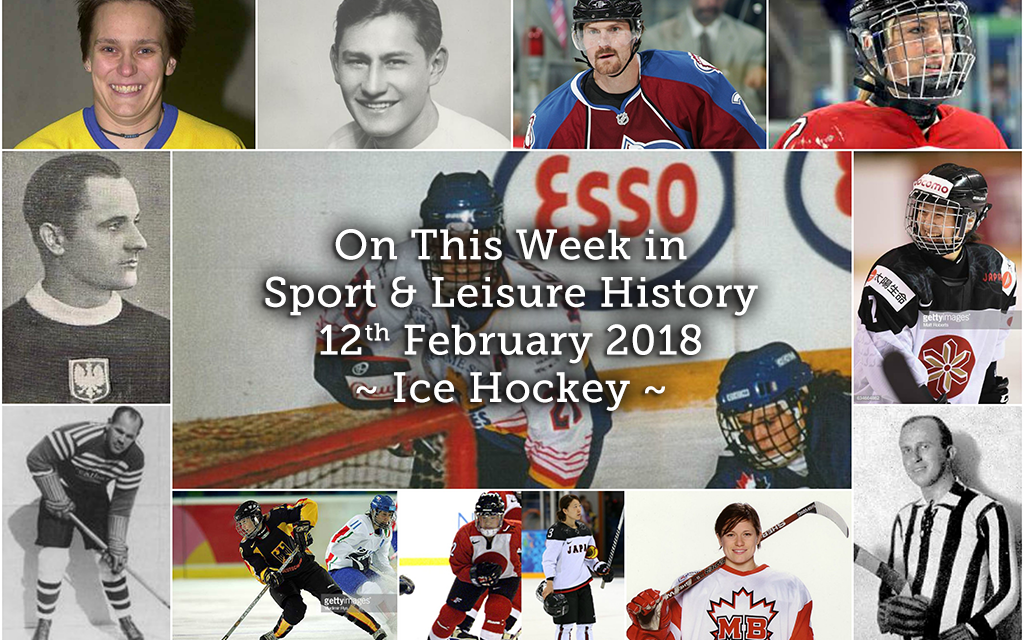
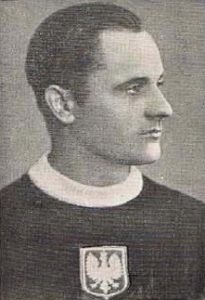
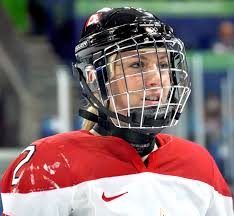
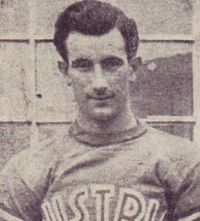
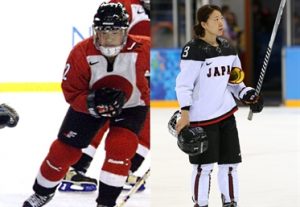
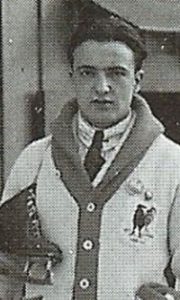

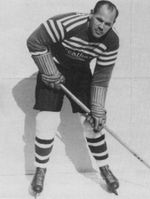
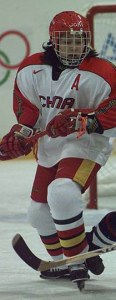
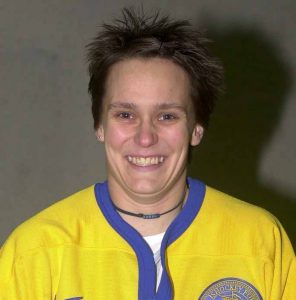
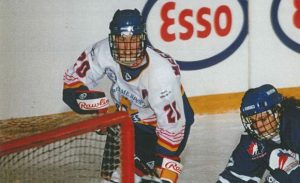
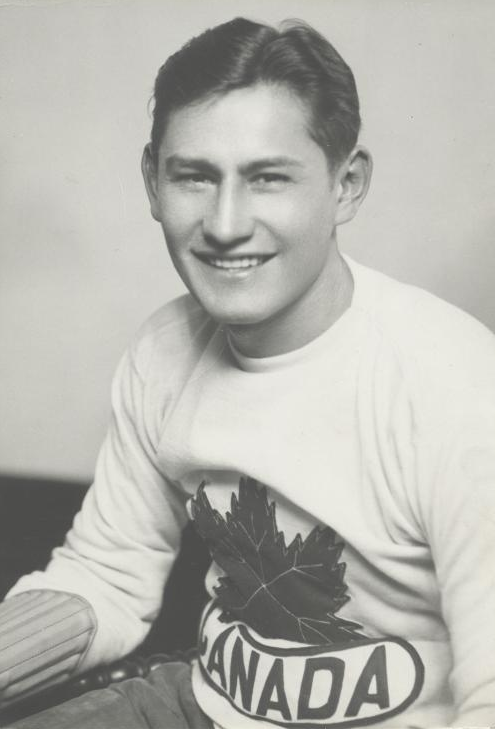
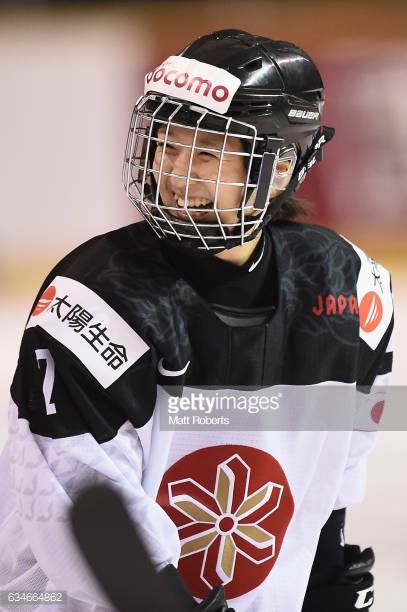
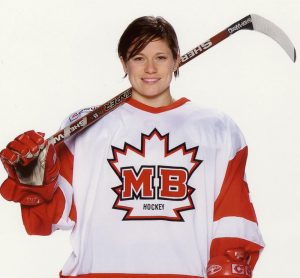
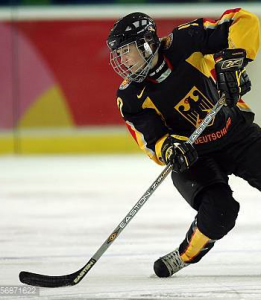
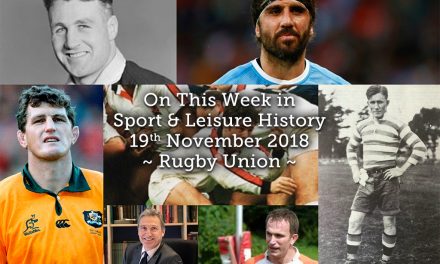
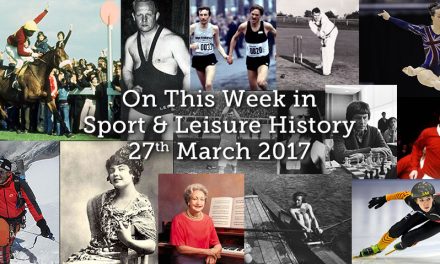
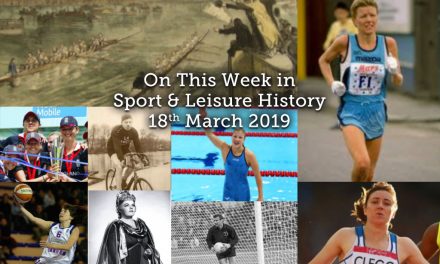

Neumaier played also both the WEV matches in the unfinished edition of Europe Cup for clubs (1935-1936). The Canadian Barry Kelly was part of that team.